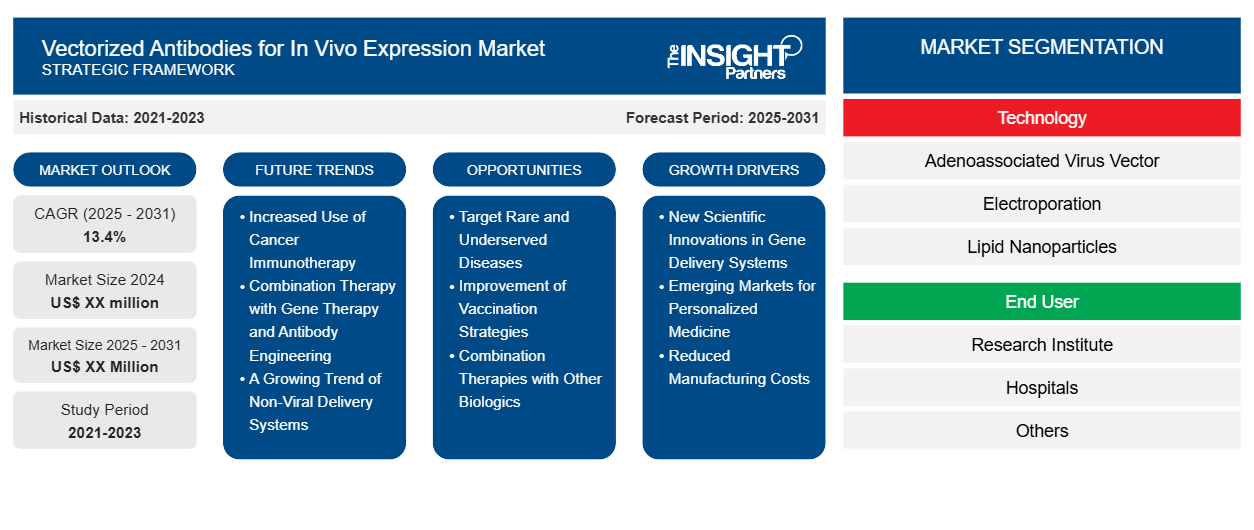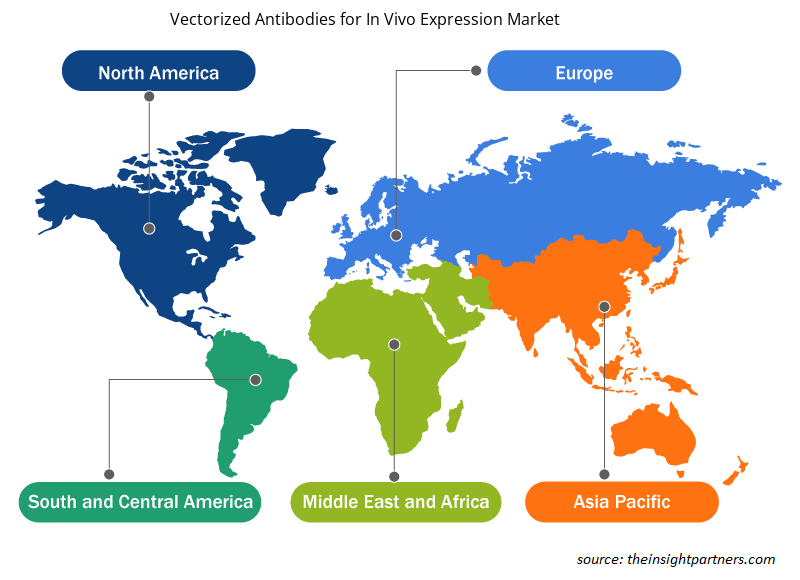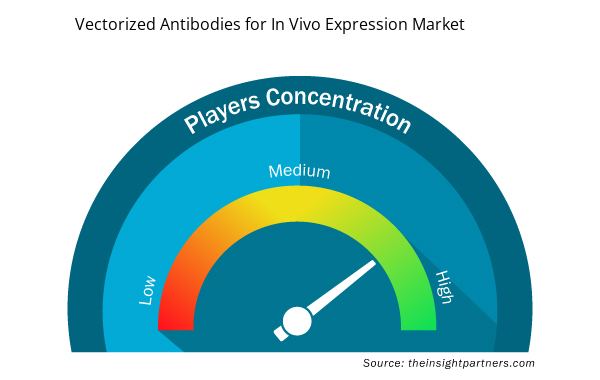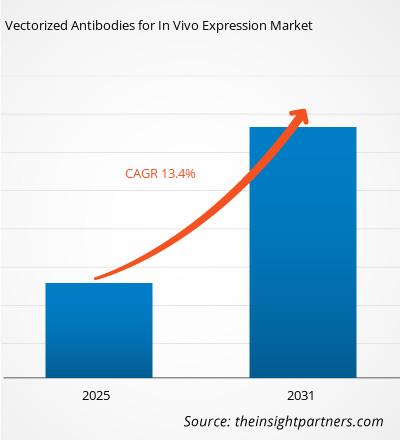The Vectorized Antibodies for In Vivo Expression Market is expected to register a CAGR of 13.4% from 2025 to 2031, with a market size expanding from US$ XX million in 2024 to US$ XX Million by 2031.
The report is segmented by Technology (Adenoassociated Virus (AAV) Vector, Electroporation, Lipid Nanoparticles (LNPs)). The report is segmented byEnd User (Research Institute, Hospitals, Others).The global analysis is further broken-down at regional level and major countries. The Report Offers the Value in USD for the above analysis and segments.
Purpose of the Report
The report Vectorized Antibodies for In Vivo Expression Market by The Insight Partners aims to describe the present landscape and future growth, top driving factors, challenges, and opportunities. This will provide insights to various business stakeholders, such as:
- Technology Providers/Manufacturers: To understand the evolving market dynamics and know the potential growth opportunities, enabling them to make informed strategic decisions.
- Investors: To conduct a comprehensive trend analysis regarding the market growth rate, market financial projections, and opportunities that exist across the value chain.
- Regulatory bodies: To regulate policies and police activities in the market with the aim of minimizing abuse, preserving investor trust and confidence, and upholding the integrity and stability of the market.
Vectorized Antibodies for In Vivo Expression Market Segmentation
Technology
- Adenoassociated Virus Vector
- Electroporation
- Lipid Nanoparticles
End User
- Research Institute
- Hospitals
- Others
Customize This Report To Suit Your Requirement
You will get customization on any report - free of charge - including parts of this report, or country-level analysis, Excel Data pack, as well as avail great offers and discounts for start-ups & universities
Vectorized Antibodies for In Vivo Expression Market: Strategic Insights

- Get Top Key Market Trends of this report.This FREE sample will include data analysis, ranging from market trends to estimates and forecasts.
Vectorized Antibodies for In Vivo Expression Market Growth Drivers
- New Scientific Innovations in Gene Delivery Systems: Advancements towards constructing more efficient and safer gene delivery systems serve as the major driving force behind the jetting vectors market. Technologies of insertion of engineered genetic material into target cells have been diversified with viral vectors (lentiviral, adenoviral, and adeno-associated viruses)- non-viral methods (liposomes, nanoparticles, and electroporation) and have enabled the precise and sustained expression of therapeutic antibodies directly in vivo without ex vivo production, purification, and administration of antibodies.
- Emerging Markets for Personalized Medicine: The other significant driver in the vectorized antibody spaces is that of personalized medicine. Such in vivo expression technologies provide a much more patient-specific treatment by delivering the patient's own genetic material into the body. This applies especially in monoclonal antibodies or engineered therapies, where the genetics of individual patients can influence treatment responses and outcome. Hence, vectorized antibodies will be one of the solutions to design and manufacture much more personalized and targeted therapies especially against complicated diseases like cancer.
- Reduced Manufacturing Costs: Conventional methods of producing such antibodies, like cell culturing, involve expensive and time-consuming manufacturing facilities. Vectorized antibodies expressed in vivo provide a promising alternative for antibody production at lowered costs. It has the advantages of completely avoiding laborious in vitro production-purification processes and reduced overall ratio manufacturing costs, not only increasing the scale-up therapy availability but also placing antibody therapies within reach of affordability, especially for smaller volumes or treatments of rare diseases.
Vectorized Antibodies for In Vivo Expression Market Future Trends
- Increased Use of Cancer Immunotherapy: This cancer immunotherapy trend is very important in driving the market for innovative antibody treatments. Antibodies that are vectorized are especially for tumor-specific antigens or modulate the immune response and emerge as the best avenue to developing more effective and durable cancer therapies. These therapies intend to program the immune system against cancer, rendering them less toxic and turning them into a more sustainable option as opposed to conventional treatments, such as chemotherapy and radiotherapy.
- Combination Therapy with Gene Therapy and Antibody Engineering: Another hybrid course: combination of gene therapy techniques with engineering of antibody molecules. The users are introducing that new discovery with the use of vectorized delivery systems in which the fine-tuned antibodies can be expressed directly in vivo since technically they are engineered to hit particular disease mechanisms. This hybrid methodology also opens the door to producing antibodies that are highly selective, less immunogenic, and clinically superior, widening the scope of the vectorized antibody market even further.
- A Growing Trend of Non-Viral Delivery Systems: The non-viral delivery systems have become mainstream in the vectorized antibodies market. They outperform the standard viral vectors in terms of safety. Emerging in vivo systems such as lipid nanoparticles and CRISPR-Cas9 gene editing technologies are proving to play a significant role in the expression of antibodies in vivo. Moreover, they provide better control over the genetic payload and efficiency of delivery and target tissues making them plausible candidates for used in widespread clinical use.
Vectorized Antibodies for In Vivo Expression Market Opportunities
- Target Rare and Underserved Diseases: Vectorized antibodies are a great opportunity to address rare and underserved diseases, especially those that need highly specific and tailored antibody therapies. In vivo expression allows for rapid and cost-effective production of therapeutic antibodies that are otherwise hard to make at scale. The analysis on orphan diseases can focus on the small patient population and high costs of traditional methods associated with their antibody production.
- Improvement of Vaccination Strategies: Vectorized antibodies will serve as a carrier for next-gen vaccine development. By delivering expression of antibodies or antibody fragments directly to the individual, these vectors target several important pathogens against which vaccination efficacy is usually compromised, including viruses and bacteria. This provides an opportunity for a more durable and vigorous immunity with infectious diseases, i.e., emerging viral infections, such as COVID-19.
- Combination Therapies with Other Biologics: Another application includes combination therapy involving vectorized antibodies, for example, with an immune checkpoint inhibitor or with CAR-T cell therapies. These approaches may enhance therapeutic efficacy while also promoting a more holistic treatment paradigm—especially in oncology. Describing them as in vivo delivery of antibodies, these treatments should allow reducing off-target risk.
Vectorized Antibodies for In Vivo Expression Market Regional Insights
The regional trends and factors influencing the Vectorized Antibodies for In Vivo Expression Market throughout the forecast period have been thoroughly explained by the analysts at Insight Partners. This section also discusses Vectorized Antibodies for In Vivo Expression Market segments and geography across North America, Europe, Asia Pacific, Middle East and Africa, and South and Central America.

- Get the Regional Specific Data for Vectorized Antibodies for In Vivo Expression Market
Vectorized Antibodies for In Vivo Expression Market Report Scope
| Report Attribute | Details |
|---|---|
| Market size in 2024 | US$ XX million |
| Market Size by 2031 | US$ XX Million |
| Global CAGR (2025 - 2031) | 13.4% |
| Historical Data | 2021-2023 |
| Forecast period | 2025-2031 |
| Segments Covered |
By Technology
|
| Regions and Countries Covered | North America
|
| Market leaders and key company profiles |
Vectorized Antibodies for In Vivo Expression Market Players Density: Understanding Its Impact on Business Dynamics
The Vectorized Antibodies for In Vivo Expression Market market is growing rapidly, driven by increasing end-user demand due to factors such as evolving consumer preferences, technological advancements, and greater awareness of the product's benefits. As demand rises, businesses are expanding their offerings, innovating to meet consumer needs, and capitalizing on emerging trends, which further fuels market growth.
Market players density refers to the distribution of firms or companies operating within a particular market or industry. It indicates how many competitors (market players) are present in a given market space relative to its size or total market value.
Major Companies operating in the Vectorized Antibodies for In Vivo Expression Market are:
- 4D Molecular Therapeutics (4DMT)
- AbbVie
- Adverum Biotechnologies
- AstraZeneca
- BioNTech
Disclaimer: The companies listed above are not ranked in any particular order.

- Get the Vectorized Antibodies for In Vivo Expression Market top key players overview
Key Selling Points
- Comprehensive Coverage: The report comprehensively covers the analysis of products, services, types, and end users of the Vectorized Antibodies for In Vivo Expression Market, providing a holistic landscape.
- Expert Analysis: The report is compiled based on the in-depth understanding of industry experts and analysts.
- Up-to-date Information: The report assures business relevance due to its coverage of recent information and data trends.
- Customization Options: This report can be customized to cater to specific client requirements and suit the business strategies aptly.
The research report on the Vectorized Antibodies for In Vivo Expression Market can, therefore, help spearhead the trail of decoding and understanding the industry scenario and growth prospects. Although there can be a few valid concerns, the overall benefits of this report tend to outweigh the disadvantages.
- Historical Analysis (2 Years), Base Year, Forecast (7 Years) with CAGR
- PEST and SWOT Analysis
- Market Size Value / Volume - Global, Regional, Country
- Industry and Competitive Landscape
- Excel Dataset



Report Coverage
Revenue forecast, Company Analysis, Industry landscape, Growth factors, and Trends

Segment Covered
This text is related
to segments covered.

Regional Scope
North America, Europe, Asia Pacific, Middle East & Africa, South & Central America

Country Scope
This text is related
to country scope.
Frequently Asked Questions
Players operating in the market are 4D MOLECULAR THERAPEUTICS (4DMT), ABBVIE, ADVERUM BIOTECHNOLOGIES, ASTRAZENECA, BIONTECH, CUREVAC, ELI LILLY, ETHRIS, EYEVENSYS
Adenoassociated Virus (AAV) Vector segment, by technology, dominated the market in 2023.
The Vectorized Antibodies for In Vivo Expression Market is estimated to witness a CAGR of 13.4% from 2023 to 2031
North America region dominated the Vectorized Antibodies for In Vivo Expression market in 2023.
Target Rare and Underserved Diseases act as a opportunity for growth of the market in forecast period.
The major factors driving the Vectorized Antibodies for In Vivo Expression market are:
1. New Scientific Innovations in Gene Delivery Systems
2. Reduced Manufacturing Costs
Trends and growth analysis reports related to Life Sciences : READ MORE..
1.4D Molecular Therapeutics (4DMT)
2.AbbVie
3.Adverum Biotechnologies
4.AstraZeneca
5.BioNTech
6.Curevac
7.Eli Lilly
8.Ethris
9.Eyevensys

 Get Free Sample For
Get Free Sample For